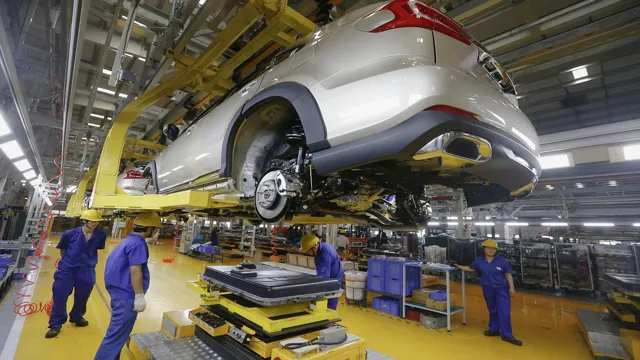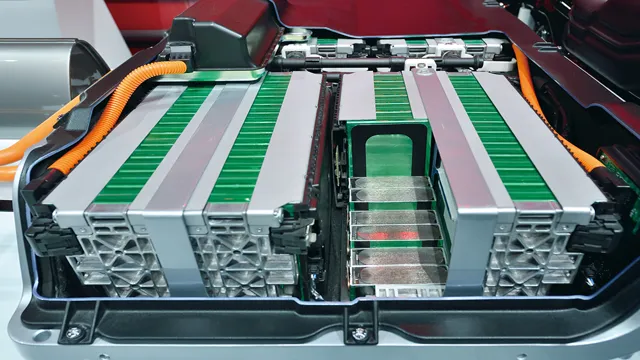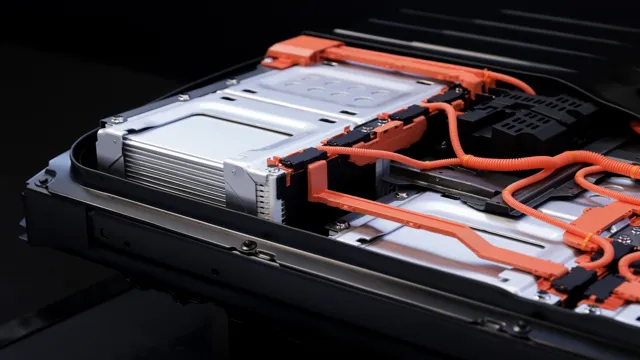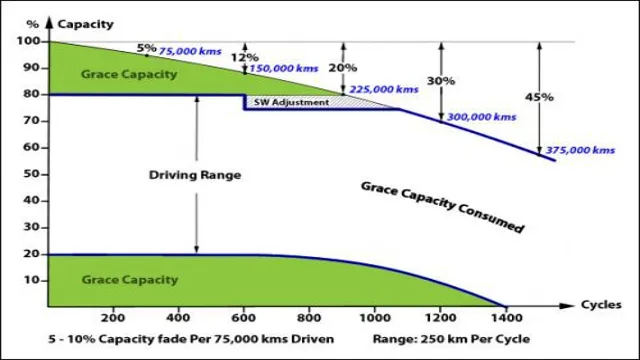Electric Cars vs Gasoline: Why Electric Car Batteries are the Future of Environmentally-Friendly Transportation
Electric cars are becoming increasingly popular, as concerns about environmental sustainability drive more people to switch to greener methods of transportation. However, some people are hesitant to make the switch due to concerns about the potential environmental impact of electric car batteries. After all, producing batteries requires a lot of resources, and disposing of them can be difficult.
In this blog post, we’ll explore the relationship between electric car batteries and the environment, looking at the benefits and drawbacks of these energy storage devices. Join us as we delve deeper into this complex issue and discover the truth behind electric car batteries and the environment.
Benefits of Electric Vehicles
Are electric cars batteries better for the environment? The answer is yes! Unlike gasoline-powered vehicles, electric cars don’t produce harmful emissions. They have no tailpipe emissions and are cleaner when it comes to greenhouse gases (GHG) as well as other pollutants. Electric vehicles (EVs) also reduce the carbon footprint of transport.
The transportation sector is responsible for 28% of global greenhouse gas emissions, so switching to EVs would significantly help cut down emissions. Moreover, with the increase in clean energy (such as wind and solar) adoption, EVs are becoming even more environmentally friendly. One of the biggest advantages of electric car batteries is that they can be recycled when they reach their end-of-life stage.
Lithium-ion batteries used by EVs have a long lifespan and are highly durable, so they can be reused several times. This reduces the cost of manufacturing new batteries and also minimizes waste. Therefore, electric car batteries are not only better for the environment but also more efficient and cost-effective in the long run.
Reduced Emissions and Pollution
Electric vehicles offer numerous benefits, and one of the most significant is their ability to reduce emissions and pollution. Unlike gasoline-powered cars, EVs emit no tailpipe pollutants, which helps to keep our air cleaner and healthier. This can lead to a decrease in respiratory problems, such as asthma, and may help to mitigate the effects of climate change.
In addition, EVs are more efficient than traditional cars, which means that they require less energy to travel a given distance. This translates into lower overall emissions and a reduced carbon footprint. Overall, electric vehicles are a smart choice for anyone looking to reduce their impact on the environment and improve their overall quality of life.

Saving Natural Resources
Electric vehicles are a great way to reduce our dependence on non-renewable resources while also saving money. One of the biggest benefits of electric cars is that they don’t require the same amount of oil and gas that traditional cars do. This means that they are much more environmentally friendly than gas-guzzlers, and they can help to reduce greenhouse gas emissions.
Another benefit of electric cars is that they can save you money in the long run. While electric vehicles may have a higher sticker price initially, they can be much cheaper to operate than traditional cars due to their lower fuel and maintenance costs. So not only are you helping the environment when you drive an electric vehicle, but you are also saving money in the long run.
Additionally, electric cars have fewer moving parts than traditional cars, which means that they are typically more reliable and require less maintenance over time. All in all, electric vehicles are a great option if you want to save money while also doing your part to help the environment.
Battery Manufacturing Impact
Are electric car batteries better for the environment? The short answer is yes, but as with most things in life, it is a bit more complicated than that. Battery manufacturing does have an impact on the environment, particularly due to the extraction of raw materials needed to produce the batteries. However, once the battery is made, it has a significantly lower impact on the environment than a traditional combustion engine.
Electric cars create zero tailpipe emissions and have longer lifespans, meaning fewer batteries need to be replaced overall. Additionally, the components of lithium-ion batteries can often be recycled, reducing their overall impact. Of course, the true impact of electric car batteries on the environment will ultimately depend on how the electricity used to power the cars is generated, as well as how the batteries are disposed of at the end of their lifespan.
However, it is clear that electric car batteries are a step in the right direction towards reducing our reliance on fossil fuels and creating a cleaner planet for future generations to enjoy.
Environmental Impacts of Battery Production
Battery manufacturing is an energy-intensive process that has significant environmental impacts. In fact, the production, transportation, and disposal of batteries are major contributors to the carbon footprint, air pollution, and waste generation. Battery production involves the extraction of raw materials such as lithium, cobalt, and nickel, which require large amounts of energy, water, and chemicals, including toxic and hazardous substances.
The process also generates greenhouse gases, particulate matter, and acid rain, which can harm human health and ecosystems. Moreover, the disposal of batteries, particularly those that contain heavy metals, can lead to soil and water contamination and pose a risk to wildlife and humans. As such, it is critical to promote sustainable battery manufacturing practices, such as recycling, reducing waste, and using renewable energy sources, to minimize the environmental impact of battery production.
Comparison to Fossil Fuel Vehicle Manufacturing
When it comes to comparing the manufacturing of electric vehicles to that of fossil fuel vehicles, one key factor to consider is the impact of battery manufacturing. While the production of battery cells and packs does require a significant amount of energy and raw materials, studies have shown that the overall carbon footprint of EV battery production is still lower than that of traditional vehicle manufacturing. In fact, a report by the Union of Concerned Scientists found that the manufacturing of electric vehicles produces about half the emissions compared to gasoline-powered vehicles over their lifetimes.
Additionally, advancements in battery technology and production methods are continually making improvements towards a more sustainable and efficient process. So while there is still room for progress and innovation, the impact of battery manufacturing on the environment is considerably lower than that of fossil fuel vehicle production.
Recycling and Disposal Impact
When it comes to the impact of battery manufacturing on recycling and disposal, there are a few key things to consider. First and foremost, the materials used in batteries can have a significant impact on the environment. Many batteries contain metals and other materials that can be harmful if not properly disposed of, which is why it’s so important to recycle batteries properly.
Additionally, the production of batteries requires a lot of energy, which can contribute to greenhouse gas emissions and other environmental issues. It’s clear that battery manufacturing has a significant impact on the environment, but there are steps we can all take to reduce that impact. By recycling our batteries and choosing energy-efficient products, we can help to reduce the environmental impact of battery manufacturing and disposal.
So next time you need to replace your batteries, be sure to recycle them properly and choose products that are designed to minimize their impact on the environment.
Comparing Electric and Gasoline Vehicles
Are electric car batteries better for the environment compared to gasoline vehicles? Electric cars have become popular due to their eco-friendliness and energy efficiency. They emit little or no pollutants during operation, contributing to a cleaner environment. Gasoline engines, on the other hand, produce carbon dioxide and other harmful pollutants that contribute to air pollution and global warming.
However, the environmental impact of electric cars depends on how they are powered. If electricity is generated from renewable sources such as solar or wind, then electric car batteries can significantly reduce carbon emissions. Nevertheless, electric car batteries have a limited lifespan and can be challenging to dispose of safely, leading to concerns about their environmental impact.
Nonetheless, research is ongoing to develop more efficient and eco-friendly batteries for electric cars. So, while electric car batteries may not be entirely perfect for the environment, they still have a lower environmental impact compared to gasoline vehicles.
Carbon Footprint of Electric Cars vs Gasoline Cars
Electric cars and gasoline cars both have a significant impact on the environment, but the magnitude of their carbon footprint differs greatly. While gasoline vehicles emit carbon dioxide (CO2) during their operation, electric vehicles generate electricity from renewable sources, which significantly reduces their carbon footprint. The battery manufacturing process, however, generates carbon emissions, but the amount is significantly less compared to gasoline vehicles over the lifetime of the vehicle.
The production of electricity for charging electric vehicles has become an increasingly green process, making electric vehicles environmentally friendly. Moreover, electric cars have extended ranges and faster acceleration than gasoline cars and are also more cost-friendly in the long term. Therefore, switching to an electric vehicle is a better option in terms of reducing carbon emission levels and protecting the environment from further damage.
Efficiency and Fuel Economy Differences for Electric vs Gasoline Cars
When it comes to choosing between an electric and gasoline-powered car, there are several things to consider. One of the primary differences is efficiency and fuel economy. Electric vehicles (EVs) are incredibly efficient as they use electricity stored in batteries to power an electric motor.
On the other hand, gasoline cars use fuel to power an internal combustion engine. This results in a much lower efficiency rate since only about 20% of the energy from the gasoline is used to move the car. In comparison, electric cars can convert over 60% of the energy stored in the batteries into movement.
This translates into significant cost savings for EV owners who can avoid buying gas at the pump. Additionally, EVs have lower maintenance costs and produce fewer emissions, making them a more eco-friendly choice. However, a downside to EVs is that they require access to charging stations, which aren’t as common as gas stations yet.
Overall, it’s important to consider your specific needs and lifestyle when deciding between an electric and gasoline car.
Conclusion
In conclusion, while electric cars batteries do have some impact on the environment during production and disposal, they are still a net positive for the environment compared to traditional combustion engines. That’s why, if you want to drive a car that’s both practical and planet-friendly, electric is the way to go. Plus, you get the added bonus of effortless acceleration and a quieter ride – what’s not to love about that?”
FAQs
How do electric car batteries impact the environment compared to traditional car batteries?
Electric car batteries are generally considered to be better for the environment than traditional car batteries because they produce fewer emissions during production and use.
What happens to electric car batteries once they reach the end of their lifespan?
Electric car batteries can be recycled, which reduces the environmental impact of their disposal. Additionally, some electric car manufacturers offer programs to repurpose old batteries for energy storage.
Are there any downsides to using an electric car battery?
Electric car batteries require rare earth metals and other resources that can be environmentally damaging to mine and process. However, some companies are working on developing more sustainable alternatives.
How do the environmental benefits of electric car batteries compare to other types of sustainable transportation?
While electric car batteries are generally considered to be better for the environment than traditional gasoline-powered cars, other forms of sustainable transportation, such as biking or public transit, may have a lower overall environmental impact.






